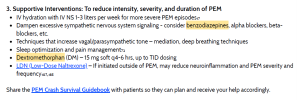Snow Leopard seems to be arguing both that if the sense of 'fatigue' in ME/CFS was due to an error in brain circuit we could image it and, on another thread, that accounts of trying to do just that are not very helpful because they may reflect all sorts of epiphenomenal events. In other word you cannot tell if you are imaging the bit you want to blame. Can you calrify
@Snow Leopard
That is a misunderstanding,
Forestglip posted a hypothesis:
impaired ability to turn off excitatory neural circuits (or alternatively, inappropriate activation of these circuits)?
I argued that we don't see any ***consistent*** patterns like that in brain imaging studies.
"selective excitation of a small proportion of neurons" in the brain isn't what we are talking about and I don't see how that would cause the hypothesised fatigue anyway.
I'm simply not interested in untestable hypotheses and you shouldn't be either.
There must be a neural correlate for subjective experiences. To me your second sentence provides an example of that, assuming reduced excitability of motor cortex always correlates with the subjective feeling of fatigue. If it doesn't, then there must be other neurons elsewhere that do.
So am I right in saying that the point you are disputing is there being a global increase in excitability that affects the whole brain, or certain whole brain regions? That seems like a fair point, but isn't the same as talking about hyperexcitability of particular circuits or individual neurons. In the example you give, the peripheral afferents could be hyperexcitable right? something like that would be consistent with what forestglip originally said (albeit in the periphery in that case) :
If the peripheral afferents are hyperexcitable, that isn't a brain problem.
The reduced excitability of the motor cortex isn't the same as the sensation of fatigue, though it can co-occur. It's a result of metabolic sensing in the muscle and the purpose is to require increased effort to maintain activity, which also results in increased ventilation per the amount of muscular force at the same time.
Which is part of my point, there doesn't seem to be any consistent magic brain "fatigue" sensation pattern, only behavioural responses to fatigue.
That seems like the most sensible and rationale approach to me, I think it would be very delusional to say to anbody "you should become a neuroscientist if you want to solve ME/CFS" but of course that doesn't matter to the nature of the problem which doesn't care whom it is being studied by.
That is literally what an 'expert' in Australia told me - if I want to understand ME/CFS I must study neuroscience. (Rob Loblay - colleague of Hickie, Lloyd)
There are breakthroughs happening in neuroscience right now - uncovering the mechanisms of neurovascular coupling - and that might provide more clues than the other vague, often untestable hypotheses about 'signalling'.
Although getting the broader category right might not be enough, as JE showed with RA and the B vs T cells divide. Plenty of immunologists were barking up the wrong tree.
The mistake was they (the T-cell people) were making untestable assumptions/hypotheses, it was simply putative. Whereas the B-cell stuff was demonstrable.
The first genuine link to show T-cell autoimmunity was a subset of Guillain Barre Syndrome patients, where they demonstrated T-cell receptor autoreactivity through sequencing in 2024. Interestingly, those who had T-cell autoreactivity didn't have autoantibodies and vice versa.
But for the analogy to hold, the people who putatively insist that ME/CFS must be a problem with the brain but say that it needs future breakthroughs in neuroscience or whatever to demonstrate are more likely to be on the wrong side of history.

